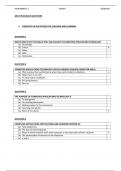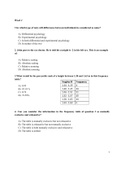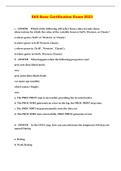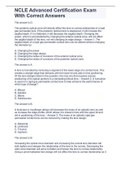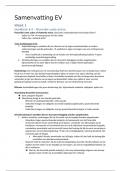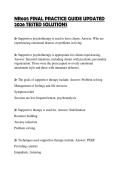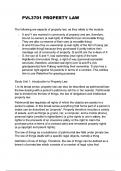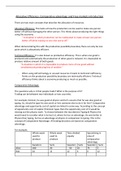Lecture 1 - History and Concepts
Social reality
- Situation
- Person
- Cognitive Processes
different people can have different cognitive processes for the same social reality
Social cognition looks at persons, acting in situations, and pays special attention
to the cognitive processes that happen.
The two pillars of Social Cognition research
Phenomenology:
- systematic description of how people say they experience themselves, their
social environments and themselves in their social environments.
- Lay theories
- Everyday psychology
- Mental models
Cognitive Psychology:
- studying how basic human cognitions (memory, attention, perception, etc.)
are organized and different ways to use them.
- Models of information processing
- Models of information retention
taken together, social cognition studies:
- How is social information encoded, stored, and retrieved from memory?
- How is social knowledge structured and represented?
- How are social judgments and decisions made?
- For all: by different people and in different situations
Some people are still neglecting cognition.
Behaviorism
- Are cognitions even the cause of behavior?
- No evidence on the causal direction of cognition-behavior link
- Cognitions could be post-hoc rationalizations of behavior
- Operant conditioning as main method of scientific inquiry
- Radical behaviorism
- “e.g., Burrhus Skinner
How to measure cognition?
- Cognitions cannot be observed (well)
- Rejection of introspective methods to study the human mind
- Reducing behavior to stimulus-response until measurement at the same level
, - Methodological behaviorism
- J. Watson
Cognitive Revolution
Overcoming methodological problems:
- Experimental manipulation of the environment
- Observe changes in behavior
- Infer mental states
- The experimental method is another core feature of social-cognitive
psychology
"Cognitive Dissonance Experiment" by Festinger and Carlsmith in 1959.
- When people experience cognitive dissonance, they are motivated to reduce it
by justifying or rationalizing their behavior or beliefs.
- $1 Condition: In this condition, participants were told they would be paid $1
for participating in the experiment and pretending to enjoy the task.
- $20 Condition: In this condition, participants were told they would be paid
$20 for participating in the experiment.
- They proposed that participants in the $1 condition experienced cognitive
dissonance because their behavior (performing a boring task) contradicted
their beliefs (the task was actually boring). To resolve this dissonance,
participants in the $1 condition convinced themselves that the task was
actually enjoyable and interesting.
- On the other hand, participants in the $20 condition did not experience
significant dissonance because their behavior aligned with their beliefs, and
thus, they did not need to convince themselves of anything.
- “I must’ve liked the study to lie for so little money”
“Cognitive Behaviorism” – Homo oeconomicus
theoretical representation of humans as rational and self-interested beings who make
decisions based on maximizing their own utility or economic well-being
- Rational
- perfectly rational, capable of processing all available information and
making decisions that maximize their personal benefit.
- Maximizing utility
- primarily by their own self-interest. They aim to maximize their own
utility, typically defined in terms of material or monetary gains.
- make choices that maximize their overall well-being or utility, based on
a clear understanding of their preferences.
- Objective (Consistent)
- consistent in their preferences and choices over time. Their
decision-making is not affected by emotions, biases, or external factors.
- Logical (... free from cognitive processing errors or biases)
,Asch conformity experiment (1951)
- The powerful influence of social pressure and the tendency to conform to the
opinions of others, even when it goes against one's own judgment.
Participants who conformed reported feelings of doubt and anxiety, but the
desire to fit in and avoid social disapproval often outweighed their confidence
in their own perception.
- Debriefing + Post-hoc interview:
- “I didn’t want to look silly or be rejected by the group”:
- normative social influence - using others as a reference for what
should be done
- "others must have had better eyesight or be better informed”:
- informational social influence - using others as a source of
information
- "this answer is actually correct”:
- distortion of perception (or “reality”)
Economics Study ()
- Dictator game:
- One person (the dictator) has the power to decide how to divide a sum
of money or resources between themselves and another person (the
receiver). The dictator's decision reveals their willingness to share or be
selfish, as the receiver has no say in the allocation.
- Ultimatum Game:
- One person (the proposer) proposes a division of money or resources to
another person (the responder). The responder can either accept or
reject the proposal. If they accept, both players receive their shares. If
they reject, neither player receives anything. This game explores
fairness and how people respond to perceived unfairness.
Two Step Decision Making Model with Human Factor
, Step 1: Cognitive Evaluation
In the first step, individuals engage in a rational and cognitive evaluation of the
available information. This involves gathering relevant data, analyzing the pros and
cons, assessing risks, and considering logical and rational factors that impact the
decision. Cognitive evaluation focuses on objective analysis and logical reasoning.
Step 2: Emotional Assessment
In the second step, individuals incorporate emotional factors into their
decision-making process. Emotions play a significant role in influencing choices and
can affect decision outcomes. This step involves recognizing and assessing emotional
reactions, personal values, intuitions, gut feelings, and subjective preferences.
Emotional assessment considers how the decision aligns with an individual's values,
desires, and emotional well-being.
Lecture 2 - Memory
Creating memories: Encoding
Recollecting memories: Retrieval
Bidirectional influence
Different influencing factors
Social reality
- Situation
- Person
- Cognitive Processes
different people can have different cognitive processes for the same social reality
Social cognition looks at persons, acting in situations, and pays special attention
to the cognitive processes that happen.
The two pillars of Social Cognition research
Phenomenology:
- systematic description of how people say they experience themselves, their
social environments and themselves in their social environments.
- Lay theories
- Everyday psychology
- Mental models
Cognitive Psychology:
- studying how basic human cognitions (memory, attention, perception, etc.)
are organized and different ways to use them.
- Models of information processing
- Models of information retention
taken together, social cognition studies:
- How is social information encoded, stored, and retrieved from memory?
- How is social knowledge structured and represented?
- How are social judgments and decisions made?
- For all: by different people and in different situations
Some people are still neglecting cognition.
Behaviorism
- Are cognitions even the cause of behavior?
- No evidence on the causal direction of cognition-behavior link
- Cognitions could be post-hoc rationalizations of behavior
- Operant conditioning as main method of scientific inquiry
- Radical behaviorism
- “e.g., Burrhus Skinner
How to measure cognition?
- Cognitions cannot be observed (well)
- Rejection of introspective methods to study the human mind
- Reducing behavior to stimulus-response until measurement at the same level
, - Methodological behaviorism
- J. Watson
Cognitive Revolution
Overcoming methodological problems:
- Experimental manipulation of the environment
- Observe changes in behavior
- Infer mental states
- The experimental method is another core feature of social-cognitive
psychology
"Cognitive Dissonance Experiment" by Festinger and Carlsmith in 1959.
- When people experience cognitive dissonance, they are motivated to reduce it
by justifying or rationalizing their behavior or beliefs.
- $1 Condition: In this condition, participants were told they would be paid $1
for participating in the experiment and pretending to enjoy the task.
- $20 Condition: In this condition, participants were told they would be paid
$20 for participating in the experiment.
- They proposed that participants in the $1 condition experienced cognitive
dissonance because their behavior (performing a boring task) contradicted
their beliefs (the task was actually boring). To resolve this dissonance,
participants in the $1 condition convinced themselves that the task was
actually enjoyable and interesting.
- On the other hand, participants in the $20 condition did not experience
significant dissonance because their behavior aligned with their beliefs, and
thus, they did not need to convince themselves of anything.
- “I must’ve liked the study to lie for so little money”
“Cognitive Behaviorism” – Homo oeconomicus
theoretical representation of humans as rational and self-interested beings who make
decisions based on maximizing their own utility or economic well-being
- Rational
- perfectly rational, capable of processing all available information and
making decisions that maximize their personal benefit.
- Maximizing utility
- primarily by their own self-interest. They aim to maximize their own
utility, typically defined in terms of material or monetary gains.
- make choices that maximize their overall well-being or utility, based on
a clear understanding of their preferences.
- Objective (Consistent)
- consistent in their preferences and choices over time. Their
decision-making is not affected by emotions, biases, or external factors.
- Logical (... free from cognitive processing errors or biases)
,Asch conformity experiment (1951)
- The powerful influence of social pressure and the tendency to conform to the
opinions of others, even when it goes against one's own judgment.
Participants who conformed reported feelings of doubt and anxiety, but the
desire to fit in and avoid social disapproval often outweighed their confidence
in their own perception.
- Debriefing + Post-hoc interview:
- “I didn’t want to look silly or be rejected by the group”:
- normative social influence - using others as a reference for what
should be done
- "others must have had better eyesight or be better informed”:
- informational social influence - using others as a source of
information
- "this answer is actually correct”:
- distortion of perception (or “reality”)
Economics Study ()
- Dictator game:
- One person (the dictator) has the power to decide how to divide a sum
of money or resources between themselves and another person (the
receiver). The dictator's decision reveals their willingness to share or be
selfish, as the receiver has no say in the allocation.
- Ultimatum Game:
- One person (the proposer) proposes a division of money or resources to
another person (the responder). The responder can either accept or
reject the proposal. If they accept, both players receive their shares. If
they reject, neither player receives anything. This game explores
fairness and how people respond to perceived unfairness.
Two Step Decision Making Model with Human Factor
, Step 1: Cognitive Evaluation
In the first step, individuals engage in a rational and cognitive evaluation of the
available information. This involves gathering relevant data, analyzing the pros and
cons, assessing risks, and considering logical and rational factors that impact the
decision. Cognitive evaluation focuses on objective analysis and logical reasoning.
Step 2: Emotional Assessment
In the second step, individuals incorporate emotional factors into their
decision-making process. Emotions play a significant role in influencing choices and
can affect decision outcomes. This step involves recognizing and assessing emotional
reactions, personal values, intuitions, gut feelings, and subjective preferences.
Emotional assessment considers how the decision aligns with an individual's values,
desires, and emotional well-being.
Lecture 2 - Memory
Creating memories: Encoding
Recollecting memories: Retrieval
Bidirectional influence
Different influencing factors

